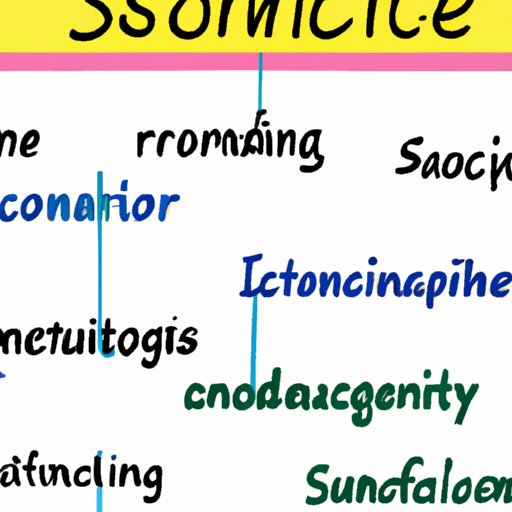Introduction
Understanding science can be challenging for many people. There are a lot of technical terms and jargon that can make it difficult to grasp the concepts. This article will provide a comprehensive guide to the language of science. It will explain what science words are and explore their types, examples and common usage. The article will also include a primer on basic principles of science terminology, a glossary of science words and a dictionary of science words for kids. Finally, it will offer strategies for understanding science jargon.

Exploring Science Words: A Comprehensive Guide
Science words are terms used in scientific fields such as mathematics, physics, chemistry, biology, etc. They are used to describe concepts, processes, theories, phenomena and more. These words are often derived from Latin or Greek roots and are used to communicate ideas and information between scientists. They are also used to explain scientific concepts to the general public.
There are several types of science words. Technical terms are used to describe specific aspects of a scientific field, while jargon is used to describe concepts and ideas within a particular discipline. Acronyms are used to shorten long words or phrases and are commonly used in medical and technological fields. Abbreviations are shortened forms of words, usually consisting of the first letter of each word in a phrase. Finally, symbols are used to represent complex equations and formulas.
Examples of science words include “gene”, which is a unit of heredity; “molecule”, which is a group of atoms bonded together; “amplitude”, which is the maximum displacement of a wave; and “photosynthesis”, which is the process by which plants convert light energy into chemical energy.
Science Terms Primer: An Introduction to the Language of Science
To better understand science words, it is important to have a basic understanding of the principles of science terminology. Scientific terminology is composed of two parts: the prefix and the root. The prefix is a word or letter at the beginning of a word, which changes the meaning of the word. For example, the prefix “un-” added to the word “happy” changes it to “unhappy”. The root is the part of the word that remains after the prefix has been removed. In the example above, the root of “unhappy” is “happy”.
Common scientific terms and definitions include “atom”, which is the smallest particle of an element; “force”, which is an influence that causes a change in motion; “gravity”, which is the attractive force between two objects; and “energy”, which is the capacity to do work.
From Amoeba to Zygote: A Glossary of Science Words
The following alphabetical list contains some of the most common science words.
- Amoeba – a single-celled organism
- Bacterium – a type of microorganism
- Chromosome – a threadlike structure found in the nucleus of cells
- DNA – a molecule that carries genetic information
- Electron – a negatively charged particle
- Fission – the splitting of an atom
- Gravity – the attractive force between two objects
- Habitat – the environment in which an organism lives
- Ion – an electrically charged particle
- Joule – a unit of energy
- Kinetic energy – energy of motion
- Laser – a device that emits a beam of light
- Mutation – a change in the genetic material of an organism
- Neutron – a neutral particle found in the nucleus of an atom
- Organelle – a specialized structure in a cell
- Protein – a molecule made up of amino acids
- Quantum – the smallest amount of energy possible
- Radiation – energy in the form of waves or particles
- Spectrum – the range of electromagnetic frequencies
- Thermodynamics – the study of heat and energy transfer
- Ultrasound – sound waves with frequencies above the human hearing range
- Vaccine – a preparation of weakened or killed microorganisms used to stimulate immunity
- Wave – a disturbance that travels through space and time
- Xylem – a tissue in plants that transports water
- Yeast – a single-celled organism used in baking and brewing
- Zygote – a fertilized egg cell

The Top 10 Most Commonly Used Science Terms
The following is a list of the most commonly used science terms, along with explanations of each term.
- Atom: The smallest particle of an element.
- Force: An influence that causes a change in motion.
- Gravity: The attractive force between two objects.
- Energy: The capacity to do work.
- Molecule: A group of atoms bonded together.
- Cell: The basic unit of life.
- Evolution: The process by which organisms change over time.
- Genetics: The study of heredity and variation.
- Nucleus: The central part of an atom.
- Photosynthesis: The process by which plants convert light energy into chemical energy.

A Dictionary of Science Words for Kids
Learning science can be fun for kids. Here are some simple definitions of science words that are geared towards children.
- Atom: A tiny particle that makes up everything in the universe.
- Molecule: Two or more atoms stuck together.
- Cell: The building blocks of living things.
- Gene: A unit of heredity.
- Force: A push or pull.
- Gravity: What keeps us stuck to the ground.
- Energy: The ability to do work.
- Evolution: How living things change over time.
- Photosynthesis: How plants make their own food.
These science words can also be used in everyday life. For example, a child could say, “Mommy, I think I need more energy to finish my homework.” Or, “Daddy, why does gravity keep us from floating away?”
How to Understand Science Jargon
It can be difficult to understand scientific jargon, but there are some strategies that can help. First, break down the word into its component parts. Look for prefixes and suffixes that can give you clues about the meaning of the word. Then, look up the definition of the root word and any other words you don’t recognize. Finally, use context clues to figure out the meaning of the word in the sentence or paragraph.
Here are some tips for understanding complex scientific terms:
- Look up unfamiliar words in a dictionary.
- Make a list of key terms and definitions.
- Use visual aids to help remember terms and definitions.
- Read scientific articles and papers to become familiar with the language.
- Ask questions when you don’t understand something.
A Layperson’s Guide to Understanding Science Terminology
For those who are not trained in the sciences, understanding scientific terminology can be daunting. However, with a little effort, it is possible to decipher scientific jargon. Start by breaking down the word into its component parts. Look for prefixes and suffixes that can give you clues about the meaning of the word. Then, look up the definition of the root word and any other words you don’t recognize. Finally, use context clues to figure out the meaning of the word in the sentence or paragraph.
Another way to gain an understanding of scientific terminology is to read scientific articles and papers. This will help you become familiar with the language and the concepts being discussed. Asking questions is also a great way to learn. Don’t be afraid to ask your teacher or professor if you don’t understand something.
Conclusion
In conclusion, science words are terms used in scientific fields to describe concepts, processes, theories, phenomena and more. They are often derived from Latin or Greek roots and are used to communicate ideas and information between scientists. There are several types of science words, including technical terms, jargon, acronyms, abbreviations and symbols. This article provided a comprehensive guide to the language of science, including a primer on basic principles of science terminology, a glossary of science words and a dictionary of science words for kids. Finally, it offered strategies for understanding science jargon.
(Note: Is this article not meeting your expectations? Do you have knowledge or insights to share? Unlock new opportunities and expand your reach by joining our authors team. Click Registration to join us and share your expertise with our readers.)
